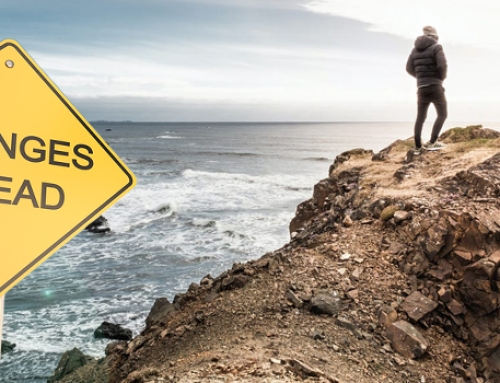For anyone who has been unemployed, when you are low on funds there is a myopic view that comes over you that tunnels your vision to getting the job or the money flowing again. All other considerations are put on hold, or ignored until the most pressing matters are taking care of. The same can be said about all that is involved in Self Reliance and Sustenance. Before you can be mentally and psychologically prepared yourself for a catastrophe, you will need to also take care of your physical needs first. While the survival/prepared mindset is a development of a mental awareness of the need to survive, you cannot get to that place until you have the confidence that you can take care of your physical needs and be self-sufficient without reliance on others e.g. the government.
This is the point where you need to take some definitive steps to get to that positive and productive mental state via your physical conditions.
As mentioned in Survival Mindset Part I and Survival Mindset Part II of this series, everyone has unique needs when it comes to survival. Add to that the unpredictability of any given emergency or calamitous situation and you have hundreds of thousands of different variations to the basic survival plans.
When you think of all this it is easy to feel and become overwhelmed. However, if you start small and build up your knowledge, develop your skills and organize necessary supplies over time you can eat this proverbial elephant with your Reliance knife and fork. Taking steps to be prepared bring to you a sense of confidence that what ever happens, whenever you shop, and especially when you make a major lifestyle decision that you have things taken care of.
Using the following as a direction to start in, you can begin to embark upon the preparedness journey and do so with fortitude and the motivation to succeed.
10 STEPS TOWARD A POSITIVE SURVIVAL MINDSET ( not set in any particular order)
1. The “what coulda’s” of possibilities.
Now it is real easy to get into the weeds on this one, however, if you are able to identify the more likely to happen for your given area for which you live, then you can narrow down what you need to guard against or prepare for. This is not as difficult as you might think. Virtually every state, and most counties and cities have an emergency preparedness website (others that are paid professionally to think about this stuff) that will outline the specific threats in your area. They may not address universal threats like nuclear dirty bombs, domestic terrorist attacks, or economic collapse but the resources for identifying those things that may likely affect you are often very thorough.
2. Prepare the Bug IN or Bug OUT kits.
Depending on the potential threats that face your area, you will need to have items gathered together to make a quick getaway or a fast lockdown possible. Think of those spy movies when the spy needs to get out of the country and they go to their stash of passports, money and hardware. Yours may not be so elaborate or clandestine but it is a wise choice to have the baggage that you can quickly pack with your essentials for the short and long term and beat a path outta town. OR have all the crucial items needed for a lockdown and sit tight scenario. We have a few articles from earlier that approach these very subjects – give ’em a looksie.
3. Develop skills for a self imposed lockdown.
In some scenarios, you may find it may be better off to sit tight and get snug without leaving your own home or neighborhood. That may sound counter-intuitive to self preservation (like what happened to the Hungarian Jews in WWII who chose to stay put) but the reality is that there are situations that require that you remain in your homestead for your survival. (Those could include massive destruction everywhere and conditions are dangerous and unsafe no matter where you go.) Sheltering at home includes learning how to seal off unused areas to conserve heat, learning to cook when there is no power, and figuring out what to do about sanitization and basic cleanliness if there is a failure in the water or sewer systems.
4. Start a Self Reliance pantry with a secure food system to accumulate the needed stash of extra food or water.
Now, all this goes down the drain in a bugging out situation, but you can identify an area in your home that you could be designated as your survival pantry. It can be a spare room, or closet, a shelf or even an area under the bed so get creative as you find a spot separate from your day to day supplies.
Here you will store and rotate through food and water that you have set aside for emergency purposes. Ever had 10 year old lima beans? Not too tasty! You can literally start by adding a few extra items to your grocery cart with each trip to the supermarket right now. Plan to save old soda bottles and use them to store extra water. Acquire items that can have several uses or one to two vital uses (knives vs. water purifier straws for example). As time and budget allow, over time you can increase the quantity of the items in your pantry stash until you feel you have enough to survive for three months, six months, a year or longer.
Hint: The point is to it all that you get started NOW, while the getting is easier and more civilized. An easy way to get started regardless of budget and space constraints is to take the month by month approach.
5. Develop useful skills beyond modern society; such as fire making, outdoor cooking, gardening, hunting, or fishing.
As you develop your knowledge and know-how for such things that can be life saving, that is where the confidence draws in. You may never need to survive outside and grow or forage for food but because there is such a learning curve on each area, if you are truly going to be self-sufficient, you need to actively embrace these skills sooner than later. Nothing worse to know that there is a way to get things accomplished and you haven’t the first clue of how to go about it.
6. Secure your home and learn self-defense.
One would sincerely hope that civil structures will not crumble, and perhaps with the groups you tie yourself to or with it may not9see number seven). But we all know that mass hysteria can result when great swathes of people panic and run for cover (or for someone else’s preps). This topic alone could fill an entire book. You have to consider all the ways that your place of domicile is vulnerable to be broken into. Protecting your family and your precious survival goods requires a diligent and concerted approach to home security. Good locks, adequate outdoor lighting, an alarm system or even a properly trained dog will help maintain a barrier of protection around your home.
Keep this in mind: People generally are lazy, and when push comes to real and actual shoving they will do whatever it takes to find comfort and relief, even to your detriment. Good guys become bad guys and bad guys have weapons. You need to come up with a plan for defending yourself against these bad guys, whether you use a shotgun, a rifle, pepper spray or a baseball bat. Do not ignore the importance of figuring this out in advance. Your life as well as the lives of your loved ones may depend on it.
7. Get to know those around where you live and gather with like-minded members of your community
There is certainly strength in numbers, and when it comes to communities that are bonded in purpose and determination, that can go a long way in keeping things safe from outside forces. The problem, though, is that not every man is as trustworthy as they must be in times of trial. As mentioned above, there are bad guys (or good guys gone bad due to the stress of the situation) that will come after you. Those who live around you are the more likely to come after your preps if they feel that they can overpower. By getting to know your neighbors and like-minded members of your community, you will have someone to watch your back – and your family – in the event you are otherwise engaged. At the same time you will know who is more likely to become a bully and try to push their weight around.
On the same ‘Watching Backs’ page, you will be there for them because you have built up a trust well in advance of the need to call that trust in to play.
In communities you can also, divide and conquer tasks, or skillsets that everyone needs in the community. Think of the small town in the pioneer days. Each person or family found something that they could produce that they could sell, trade or barter for the other items needed for a household.
8. Know your stuff. Educate yourself.
It is the only thing you can take with you when you die. And while you are still here you can be a great asset to those around you with the knowledge AND experience of doing essential things to living the good life. Expand your knowledge by reading books, getting hardcopy reference guides, watching videos and practicing your skills that you want to develop on a regular basis. Now is the prime time, the internet has a wealth of resources available, but keep in mind that in a grid down situation, the internet and your computers will be down as well. Build up a print library that you can call upon when times get tough and the grid is down. And keep learning.
9. Practice, is not perfection, it is permanence.
I have said this many times before, when you want something to stick with you, you do it as many times as possible until it does. All the planning in the world will be completely useless if you’ve never actually done what you’ve read about. Book learning can only go so far in this uncivilized world that may play out. Unplug from the electronic stimuli for a weekend and learn and practice what you have read about. Try to simulate some of the conditions that may arise, and keep track of your results; they will help you do better the next time and will greatly enhance your ability to survive if you are ever called upon to use your survival skills.
10. Conquer Your Fear
Don’t be a deer in the headlights when it comes to the challenges and obstacles that come to you in this life. Debilitating fear can paralyze you to inaction and be one of the greatest hindrances to one’s survival let alone well-being. It is the fear of the unknown, which is a human trait and will always be present, that truly needs to be overcome. The key is to conquer that fear and wrap your head around the possibilities. Once you do knock it out of your life, know that it is there and accept it, is the only time you can truly move forward to being more constructive with your efforts.
YOUR MISSION CAN BE ACCOMPLISHED: A CONFIDENT MINDSET
The ultimate goal of mine (and subsequently should be yours) of these last three articles has been to help develop a sense for a Survival Mindset by embracing and incorporating survival and preparedness tactics into the fabric of your daily life today. Whether this is done one step at a time over the period of a year or in a marathon effort over the course of a month, being prepared requires that you embrace the hard stuff; the execution of tasks, skills and mental gymnastics with diligence, perseverance, and enthusiasm. This is not something for the slacker or what the progressive can fully wrap their heads around.
The Self Reliance or Survival Mindset means you are focused, that you have the self-discipline to navigate a multitude of situations, overcoming fear and without panic. Moreover, you have the ability to set priorities and follow though to their completion. And perhaps, most important, you have the ability to accept your human condition with optimism and grace and with a positive and productive attitude toward life and the world around you.
A Survival Self Reliance Mindset is a Path that Will Bring Peace and Calm in to Your Life
Overall TakeAway
Some may not truly understand this mindset, nonetheless, with this healthy mindset, you can take confidence in applying its concepts and precepts to your own set of circumstances and life choices. Nothing needs to be scary about it all, nothing odd or eccentric either. And this way of thinking is certainly nothing to hide from or be ashamed of. It means developing a plan to exist in a healthy, secure, and positive manner with adequate food, clothing, and yes, sources of enjoyment without the fear of helplessness or lack of total control. Being an actor instead of being acted upon, or more succinctly put, be a lion not a sheep.
Within yourself you must find the inspiration and courage to embark upon the path of complete independence fromoverbearing institutions so that you are prepared for the unexpected contingencies of life.






